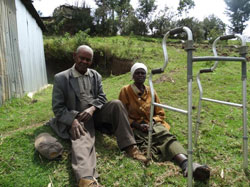Kenya - Two Lives Changed with One Commode
Three years ago, Teresia Murugi, a mother of three from Maai Mahiu, Kenya, was diagnosed with spinal tuberculosis. She now walks with the support of crutches. Although doctors told her she may never walk again unaided, she believes that one day she will. Her strong conviction comes from improvements she made in the hospital after being bedridden for six months.
She recalls how her suffering started with a rare cold feeling in the feet. Then one afternoon while working in the fields, she suddenly collapsed. Thinking it was exhaustion, she tried getting up but couldn’t manage. That was the last time she remembers being on her feet without any support. Her condition worsened each day and then she started experiencing lapses in memory. 
Caring for her became an uphill task for her aging husband John Njau, who was her only companion since their three children married and moved away from home.
Njau used to place her on a sack and drag her outside and back into the house. He could not carry her due to his old age. “Before I used to help her relieve herself just outside the house,” says Njau. “I would collect the feces and discard them in the latrine. It used to be messy, with flies all over the place.”
When Teresia came back from the hospital, the situation was better. She could use crutches to walk around the homestead. She could also do light household chores such as washing dishes while seated. But the couple still faced challenges. Even with the help of crutches, Teresia could not use a normal latrine. She still relieved herself outside and her husband would then scoop and dispose of the waste. Teresia says her inability to use the latrine robbed her of dignity and was demeaning. She worried about the burden on her husband, who besides caring for her had to work on their small farm.
Wangari Ndung’u, a community health volunteer who is also their daughter-in-law, used to watch in despair. She did not know how to help. But in 2013, Wangari attended a WASHplus training workshop where she learned about simple ways to improve sanitation for people whose movement is restricted by illness or disability.
After the training and feeling empowered, Wangari visited the old couple with a solution in mind. She told them how they could make a commode from an ordinary chair and a bucket. Following his daughter-in-law’s suggestion, Teresia’s husband constructed a commode.

